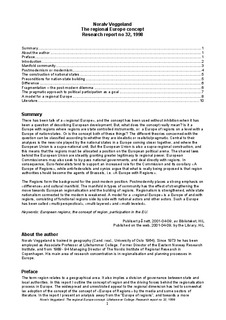The regional Europe concept
Research report
Permanent lenke
http://hdl.handle.net/11250/144869Utgivelsesdato
1998Metadata
Vis full innførselSamlinger
Sammendrag
There has been talk of a «regional Europe», and the concept has been used without inhibition when it has
been a question of describing European development. But, what does the concept really mean? Is it a
Europe with regions where regions are state controlled instruments, or a Europe of regions on a level with a
Europe of nation-states. Or is the concept both of these things? The different theories concerned with the
question can be classified according to whether they are idealistic or realistic/pragmatic. Central to their
analyses is the new role played by the national states in a Europe coming closer together, and where the
European Union is a supra-national unit. But the European Union is also a supra-regional construction, and
this means that the regions must be allocated a position on the European political arena. The shared laws
behind the European Union are steadily granting greater legitimacy to regional power. European
Commissioners may also seek to by-pass national governments, and deal directly with regions. In
consequence, Euro-federalists tend to support an increased role for the Commission and its corollary «A
Europe of Regions», while anti-federalists and cynics argue that what is really being proposed is that region
authorities should become the agents of Brussels, i.e. «A Europe with Regions».
The Regions form the background for the post-modern position. Postmodernity places a strong emphasis on
«difference» and cultural manifold. The manifold in types of community has the effect of strengthening the
move towards European regionalisation and the building of regions. Regionalism is strengthened, while state
nationalism connected to the modern is weakened. A model for a «regional Europe» is a Europe of and with
regions, consisting of functional regions side by side with national actors and other actors. Such a Europe
has been called «multi-perspectival», «multi-layered» and «multi-leveled».
Utgiver
Høgskolen i LillehammerSerie
Forskningsrapport32
